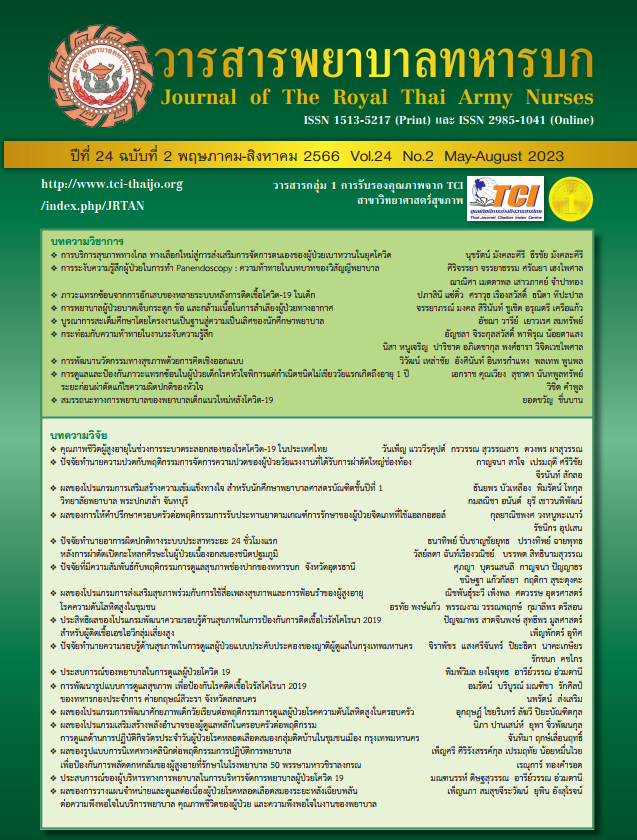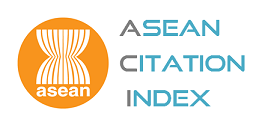สมรรถนะทางการพยาบาลของพยาบาลเด็กแนวใหม่หลังโควิด-19
คำสำคัญ:
สมรรถนะพยาบาล, พยาบาลเด็กแนวใหม่, โควิด 19บทคัดย่อ
บทความวิชาการนี้มีวัตถุประสงค์เพื่อนำเสนอความรู้เกี่ยวกับสมรรถนะพยาบาลเด็กแนวใหม่หลังโควิด-19 ประกอบด้วย สมรรถนะพยาบาลเด็กในยุคการเปลี่ยนแปลง การพยาบาลเด็กผู้ป่วยโควิด-19 การพัฒนาสมรรถนะของพยาบาลเด็กในอนาคต สมรรถนะที่จำเป็นของพยาบาลเด็กยุคโควิด-19 โควิด-19 โรคระบาดที่ถือเป็นความท้าทายครั้งใหญ่ ประเทศไทยได้รับผลกระทบ จากโควิด-19 ซึ่งส่งผลกระทบต่อชีวิตของผู้คนในทุกด้าน ทุกภาคส่วนของสังคมจึงช่วยกันแสวงหาการรับมือและแก้ปัญหา ซึ่งต่าง ก็เห็นตรงกันว่าควรมีการเรียนรู้และมองไปข้างหน้า (Post COVID-19) พร้อมกับหาโอกาสในวิกฤติเพื่อให้ชีวิตปกติกลับคืนมาและ มีความเป็นอยู่ที่ดีขึ้น ในช่วงการระบาดของโควิด-19 ในประเทศไทยพบว่า ผู้ป่วยเด็กอายุน้อยกว่า 10 ปีมีการติดเชื้อร้อยละ 2.71 ของจำนวนผู้ป่วยทั้งหมดและอายุน้อยที่สุดที่ติดเชื้อคือ 1 เดือน โควิด-19 จึงส่งผลกระทบด้านสาธารณสุขในส่วนของผู้ให้บริการ บุคลากรทางการแพทย์มีภาระงานเพิ่มขึ้นพร้อมๆ กับการขาดแคลนกำลังคน ในส่วนพยาบาลเด็กจึงต้องสามารถศึกษาหรือสืบค้น แนวปฏิบัติการพยาบาลผู้ป่วยเด็กติดเชื้อ COVID-19 รวมถึงเพื่อป้องกันการแพร่กระจายเชื้อที่ถูกต้องได้อย่างเหมาะสมและมี ประสิทธิภาพ หากพยาบาลเด็กมีความรู้ความสามารถและพร้อมที่จะปฏิบัติงานจะช่วยให้มีความมั่นใจในการดูแลผู้ป่วยเด็กมากขึ้น และสามารถเผชิญกับสถานการณ์ต่างๆ ตัดสินใจแก้ไขปัญหาและช่วยเหลือผู้ป่วยเด็กได้ทันเหตุการณ์ ดังนั้นพยาบาลเด็กทุกคนจึง ต้องมีความรู้ความสามารถที่เพียงพอ สามารถปรับตัวและเรียนรู้วิธีการป้องกันการติดเชื้อและการแพร่กระจายเชื้อที่ถูกต้อง สรุปได้ ว่าสมรรถนะพยาบาลเด็กแนวใหม่เป็นความท้าทายที่จะทำให้ผู้ดูแลผู้ป่วยเด็กสามารถจัดการกับโรคโควิด 19 ได้อย่างมีประสิทธิภาพ และได้รับการยอมรับจากพ่อ แม่ หรือผู้ปกครองเด็กที่ห่วงใยลูกหลานในยามที่ครอบครัวต้องเผชิญโรคนี้
Downloads
เอกสารอ้างอิง
Sabeerabi B, Vemula S, Vadde R, Nagaraju GP. COVID-2019: Where is the treatment? .World Journal of Clinical Oncology. 2021; 12 (5) : 309-22.
Dong et al. (Dong Y, Mo X, Hu Y, Qi X, Jiang F, Jiang Z, et al. Epidemiological characteristics of pediatric patients with 2019 coronavirus disease in China. Pediatrics. 2020 ; doi:10.1542/peds.2020-0702
Manmana S., Iamsirithaworn S., Uttayamakul S., Coronavirus Disease-19 (COVID-19). Journal of Bamrasnaradura Infectious Diseases Institute. 2022; 14(2) : 124-33. (in Thai)
Department of Disease Control. Ministry of Public Health. Daily COVID-19 report, Nonthaburi,Thailand. 2022. (in Thai)
Pensirinapa N., Burnout Syndrome among Health Personal during Pandemic of Covid-19. Journal of Council of Community Public Health. 2021: 3(3): 1-16.
Bröder J, Okan O, Bauer U, Bruland D, Schlupp S, Bollweg TM, et al. Health literacy in childhood and youth: A systematic review of definitions and models. BMC Public Health. 2017; 17(1) : 361.
Akkadechanunt T. Nurses’ Competency and Public Healthcare Innovations in Thailand 4.0 Era. Journal of Thailand Nursing and Midwifery Council. 2019; 34(1): 5-13. (in Thai)
Kalyanamitra K. Skill essential for the future work performance in the post covid-19 era. Journal of MCU Buddhapanya Review. 2021; 6 (3): 163-76. (in Thai)
Fongchamnan S.The Development of Competencies of Newborn Professional Nurses at a Tertiary Level Hospital in Medical Service Department under Bangkok Metropolitan Administration. Bangkok : Christian Univerdity of Thailand; 2015. (in Thai)
Watcharaach J, Meelai W, Pitaksil A., Kampang P. Competency incritical neonatal care of professional nurses, Health Service Provider Board Office 6. Ministry of Public Health. Journal of Health Science Research. 2017 ; 11(1) : 99-109. (in Thai)
Utthiya P., Sereewichayasawad N. Roles of Nurses in Home Health Care Unit in the COVID 2019 Pandemic Situation. Journal of The Royal Thai Army Nurses. 2022 ; 23 (2) : 25-32. (in Thai)
Oumtanee A., Pornmesri A., Chintapanyakun T., Raimaturapong J. Nursing Management during the COVID-19 Pandemic at Samutprakarn Hospital. Journal of The Royal Thai Army Nurses, 24(1) : 249-58. (in Thai)
Kuewong G. The COVID-19: Nursing practice for pediatric patients. Journal of Nursing Science & Health. 2020; 43 (4) : 1-11. (in Thai)
Wiriyanupappong W., Pungsawang N., Nurses’s Roles in Caring for Child Patients with COVID-19 Undergoing Home Isolation. Journal of The Royal Thai Army Nurses. 2022 ; 23(3) : 8-15 (in-Thai)
Perathoranich C., Challenges of Education Management in the Disruptive Change Era of School Administrators. Journal of Inclusive and Innovative Education, 4(2) : 126-39. (in Thai)
Chukumnird S.,Intaranarong K., Vongpradit S.. Registered nurses’ nursing competency of patients with COVID-19. Journal of Nursing and Health Research . 2022 ; 23(2) : 71-86. (in Thai)
Peiró, T., Lorente, L. & Vera, M. (2020). The COVID-19 crisis: skills that are paramount to build into nursing programs for future global health crisis. International Journal of Environmental Research and Public Health, 17(18), 6532. doi:10.3390/ijerph17186532
Karnjuš, I., Prosen, M. & Ličen, S. (2021). Nurses’ core disaster-response competencies for combating COVID-19 -a cross-sectional study. PloS One, 16(6), 1-3. doi:10.1371/journal. pone.0252934
Li, H., Dong, S., He, L., Wang,R., Long, S., He, F., ..., Feng, L. (2021). Nurses’ core emergency competencies for COVID-19 in China: a cross-sectional study. International Nursing Review, 68(4), 524-32.
Vázquez-Calatayud, M., Regaira-Martínez, E., Rumeu-Casares, C., Paloma-Mora, B., Esain, A., & Oroviogoicoechea, C. 2022. Experiences of frontline nurse managers during the COVID-19: a qualitative study. Journal of Nursing Management, 30(1), 79–89. doi:10.1111/jonm.13488
Lauck, S. B., Bains, V. K., Nordby, D., Iacoe, E., Forman, J., Polderman, J. & Farina, L. 2022. Responding to the COVID-19 pandemic: development of a critical care nursing surge model to meet patient needs and maximizecompetencies. Australian Critical Care, 35(1), 13-21. doi:10.1016/j.aucc.2021.02.009
Nursing and Midwifery Profession Act B.E. 2528 (1985) and amended by Nursing and Midwifery Profession Act (No. 2), 1997.
ดาวน์โหลด
เผยแพร่แล้ว
รูปแบบการอ้างอิง
ฉบับ
ประเภทบทความ
สัญญาอนุญาต
ลิขสิทธิ์ (c) 2023 วารสารพยาบาลทหารบก

อนุญาตภายใต้เงื่อนไข Creative Commons Attribution-NonCommercial-NoDerivatives 4.0 International License.
บทความหรือข้อคิดเห็นใดใดที่ปรากฏในวารสารพยาบาลทหารบกเป็นวรรณกรรมของผู้เขียน ซึ่งบรรณาธิการหรือสมาคมพยาบาลทหารบก ไม่จำเป็นต้องเห็นด้วย
บทความที่ได้รับการตีพิมพ์เป็นลิขสิทธิ์ของวารสารพยาบาลทหารบก
The ideas and opinions expressed in the Journal of The Royal Thai Army Nurses are those of the authors and not necessarily those
of the editor or Royal Thai Army Nurses Association.







